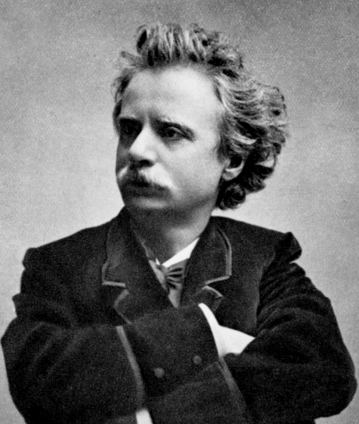爱德华·格里格
作曲
Edvard Grieg composed his first piano pieces at the age of nine – as a child, he was exposed to many musical influences: his mother, who taught him the piano at an early age, occasionally performed as a pianist in the concerts of the music society Harmonien. It was here that Grieg learnt the Classical and early Romantic orchestral and chamber music repertoire, which was to have a great influence on his later development as a composer and pianist.
At the age of 15, Grieg’s parents sent him to Leipzig, where his teachers included Carl Reinecke and Ignaz Moscheles. On his return to Bergen, Grieg made a name for himself as a performer of piano pieces inspired by Schumann’s poetic sound world. For further training, the young musician moved to Copenhagen, where he composed a symphony at the suggestion of Niels Wilhelm Gade, the last three movements of which were premiered with great success at the Copenhagen concert society Euterpe in 1864. In his exploration of the works of Danish composers such as Rikard Nordraak, Grieg increasingly strove for a “Nordic” sound based on local folklore, an endeavour in which he was encouraged by the violinist and composer Ole Bull: through him, the composer learnt many folk songs as well as the art of the Hardanger fiddlers, which soon had an impact on his works. After moving to Christiania (Oslo) in Norway, Grieg established himself as a pianist and piano teacher until he was able to travel through Germany and Italy with the help of a state scholarship. While travelling, he met Franz Liszt, who encouraged him to pursue his chosen path – which had led to accusations of “Norwegianness”, particularly in Germany. After returning home, Grieg founded the Musikforeningen in Christiania in 1871, giving the city its first professional orchestra. Due to his contribution to the nation, the Norwegian state awarded Grieg an honorary salary in 1874 – the same year in which he began work on the incidental music for Ibsen’s drama Peer Gynt. Grieg then lived as a freelance composer, living alternately in Christiania and Bergen. When he died in 1907, he was one of the most famous composers in Europe.